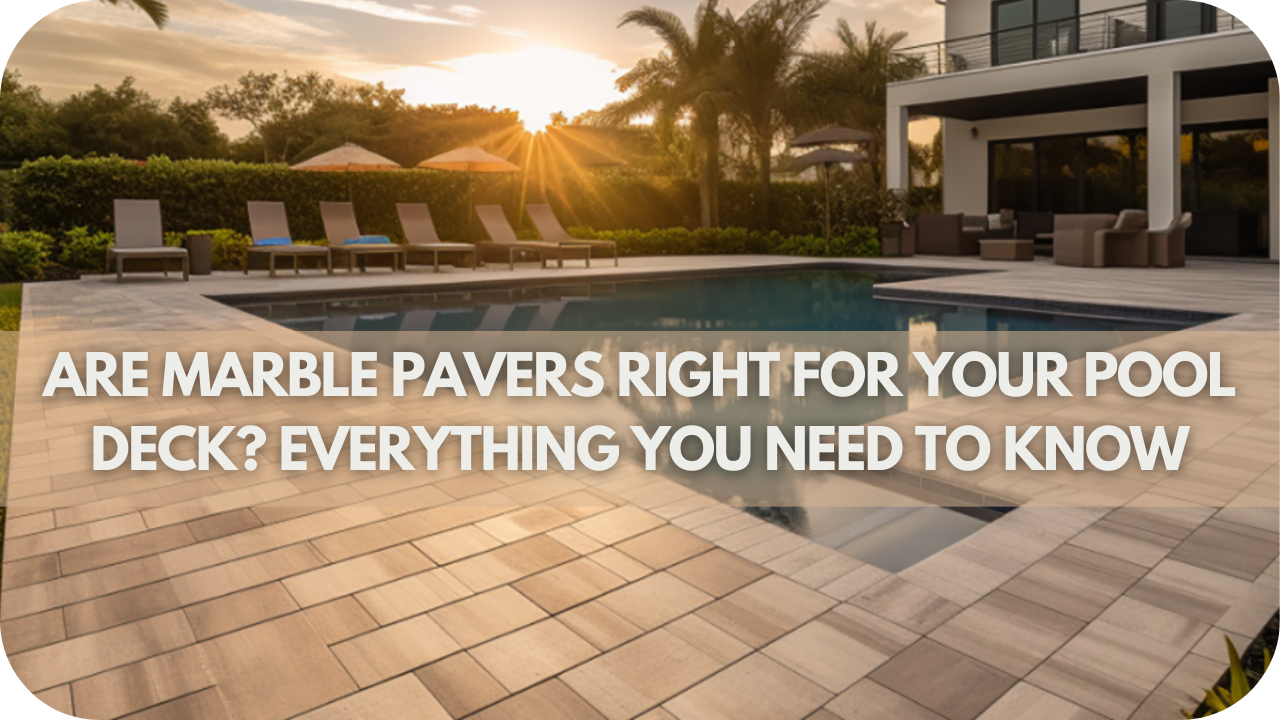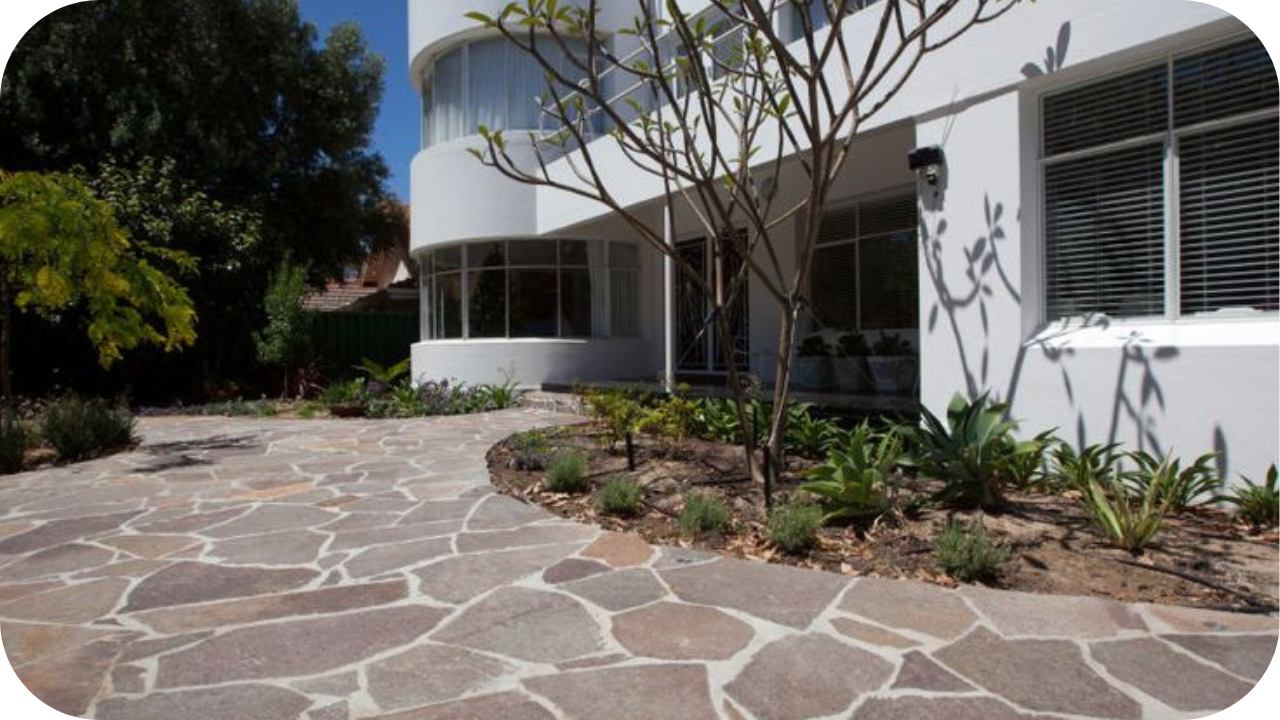
Pool decks take a beating. Exposure to harsh sunlight, pool chemicals, and foot traffic can quickly turn an elegant space into an eyesore.
But what if your chosen paver enhances the look and fails to withstand the wear and tear? Uneven surfaces, slipping hazards, and a lack of comfort underfoot can frustrate relaxing poolside.
Explore whether marble pavers are the answer to your pool deck woes. This guide covers everything you need to know to make an informed choice.
Pros of Using Marble Pavers for a Pool Deck
Transform your pool deck into a luxurious haven with marble pavers that blend timeless beauty with these practical benefits.
1. Luxury
Marble pavers exude luxury. Their timeless appearance instantly elevates the aesthetic appeal of any poolside area, adding a classic touch. The natural veining and unique patterns give each paver an exclusive look, enhancing the sense of luxury.
2. Cool Underfoot
Known for being naturally cool underfoot, marble is a welcome relief during the hottest summer days – making it perfect for bare feet! The cooling effect ensures comfort, especially around pool areas with overwhelming heat. Choosing marble can make lounging by the pool a pleasant experience, even during peak summer.
3. Durability
Marble can withstand frequent exposure to water and UV rays without losing its stunning finish. This makes it an excellent choice for pool areas that require long-lasting materials. The stone’s inherent strength ensures it maintains its integrity even under high foot traffic, preserving its beauty for years.
4. Ease of Maintenance
Marble pavers are relatively easy to maintain. Regular sweeping and occasional cleaning keep them pristine, while their natural resistance to algae and mildew adds convenience. Proper sealing makes marble even easier to manage, as the sealer helps repel water and prevent staining from pool chemicals.
5. Heat Resistance
One of the unique qualities of marble is its ability to stay cool even under intense sunlight. This feature makes marble a comfortable option for barefoot pool-goers, particularly in hot climates. Unlike darker stones that absorb and retain heat, light-coloured marble reflects sunlight, providing a more excellent surface.
6. Function and Form
If you value function and form, marble pavers are worth serious consideration! They combine aesthetic appeal with practical features, making them versatile for pool decks. Marble’s luxurious look and its functional benefits ensure your pool area remains stylish and safe, offering the perfect blend of beauty and utility.
Cons of Using Marble Pavers for a Pool Deck
Before choosing marble, it’s important to weigh the potential drawbacks of its luxury appeal. Marble may look stunning but comes with cost, maintenance, and safety concerns. Understanding these factors will help you decide what is best for your pool area.
1. Cost
The cost of marble pavers tends to be higher than that of other materials, which may be off-putting if you’re on a tight budget. The initial investment includes the cost of the material and the cost of professional installation, which can add up quickly.
2. Porosity
Marble is porous, meaning sealing is required regularly to prevent staining from pool chemicals or algae build-up. Marble can absorb water and other substances without proper sealing, leading to discolouration and damage. Regular maintenance is key to preserving its look and longevity.
3. Surface Scratches
Heavy usage can lead to surface scratches, affecting the visual appeal over time. Marble is a relatively soft stone compared to other natural materials, and sharp or heavy objects can easily mar its surface. Protective mats and avoiding dragging furniture can help reduce the likelihood of scratches.
4. Installation Cost
Installing marble pavers requires skilled labour, which adds to the initial outlay. Proper installation is crucial to ensure the pavers are level and secure, especially around a pool with constant water exposure. Hiring experienced professionals will guarantee that the marble is installed correctly, but it does increase the overall project cost.
How to Choose the Right Marble Pavers for Your Pool Deck
Selecting the ideal marble pavers for your pool deck can feel overwhelming, but with the right knowledge, you can create a stunning and functional space. Let’s explore the key factors that make your pool deck beautiful and practical.
1. Finish
Consider the finish—a honed surface will provide better slip resistance, while a polished one might look more luxurious but be riskier when wet. A honed finish has a matte texture that reduces glare and adds a layer of safety around wet areas, making it a popular choice for pool decks.
2. Outdoor Suitability
Ensure the marble type you select is suitable for outdoor use, as not all varieties can effectively handle weather extremes. Some types of marble are more porous and may not be able to withstand constant exposure to moisture, making them less ideal for outdoor installations.
3. Thickness
Another key element is the pavers’ thickness; thicker options are generally more durable. For pool decks, a thickness of at least 2 cm is recommended to handle high foot traffic and resist cracking or shifting over time. Thicker pavers can better withstand impacts and offer more stability.
4. Colour
Don’t overlook colour – lighter shades like white or beige will remain cooler underfoot. While visually striking, darker marble can absorb more heat and become uncomfortable to walk on during hot weather. Choosing a lighter colour keeps the area cool and enhances the pool deck’s brightness and spaciousness.
What is the Best Way to Clean Marble Pavers?
Maintaining marble pavers isn’t as complex as it seems! Start by sweeping the area regularly to clear away dirt and debris, as this prevents scratches. Use a gentle pH-neutral cleaner mixed with water for deeper cleaning, as acidic substances can etch the marble’s surface.
Avoid harsh chemicals like bleach or vinegar to keep the pavers from becoming damaged. A soft-bristle brush can help remove any build-up, especially around the pool’s edges.
Stubborn stains should be treated with a marble-specific poultice. After each cleaning, a quick rinse with clean water will ensure no residue lingers, preserving the paver’s elegance.
How Often Should Marble Pavers be Sealed?
Sealing marble pavers is crucial to maintaining their beauty. Depending on usage and exposure to pool chemicals, pavers should be resealed once every one to two years. High-traffic areas might require more frequent sealing to keep the surface protected.
Before resealing, inspect the surface; if water no longer beads on the marble, it’s time to reapply the sealer. A high-quality, penetrating sealer ensures deeper protection, keeping out moisture and reducing staining. Clean the pavers thoroughly before sealing – sealing over dirt can trap it, causing more harm than good. Regular sealing is the secret to longevity!
Can Marble Pavers Withstand Saltwater Pools?
Saltwater pools demand materials that resist corrosion; marble might be ideal sometimes. Although marble has a certain resistance level, salt can cause etching or dull the finish over time without proper care.
Sealing plays a major role here. Using a high-grade sealer specifically designed for saltwater can significantly boost marble’s durability. Regular rinsing after exposure to saltwater can also help prolong the finish.
If a saltwater pool is your dream, choosing a robust sealing routine and consistent maintenance can make marble pavers work. But without these steps, deterioration is inevitable.
Do Marble Pavers Retain Heat in Summer?
Heat retention is an important factor when considering marble for pool decks. Marble, being a naturally cool stone, does a fantastic job of keeping people comfortable even during summer.
Light-coloured marble pavers, such as white or cream, reflect more sunlight than darker options, keeping them cooler underfoot. Of course, on sweltering days, they might warm slightly, but far less than other materials like concrete or dark granite.
If staying cool by the pool is a priority, choosing light marble is your best bet. It’s a refreshing alternative that helps keep the pool area enjoyable!
Is it Necessary to Reseal Marble Pavers After Installation?
Yes, resealing marble pavers after installation is essential to protect against moisture, stains, and wear. Initial sealing acts as a barrier, but that layer wears away over time, making resealing necessary. It’s best to wait 24-48 hours after installation before applying the first coat, ensuring the pavers have settled properly.
For best results, a high-quality penetrating sealer should be used, providing resistance against water—and oil-based stains. Maintenance doesn’t end there—regular inspection and resealing when required will keep your marble pavers looking pristine. With consistent care, your pool deck will retain its elegant charm.
Conclusion
Marble pavers can transform your pool deck into a stunning, luxurious space if you are ready to invest in maintenance and care.
To enjoy a beautiful, functional poolside area, choose the right marble and maintain it properly. Ready to take the plunge?
Consult Splendour in Stone today to bring your vision to life!
More To Explore

Why Marble Wall Cladding Is Perfect for Luxury Interiors
Few materials capture the essence of luxury quite like marble. For centuries, it has brought elegance and refinement to the world’s most prestigious interiors. In

5 Reasons to Choose Porphyry Pavers for Your Landscaping Project
Porphyry is a unique natural stone valued for its volcanic origin, dense composition, and rich colour variation. With embedded crystals and earthy tones like grey,


